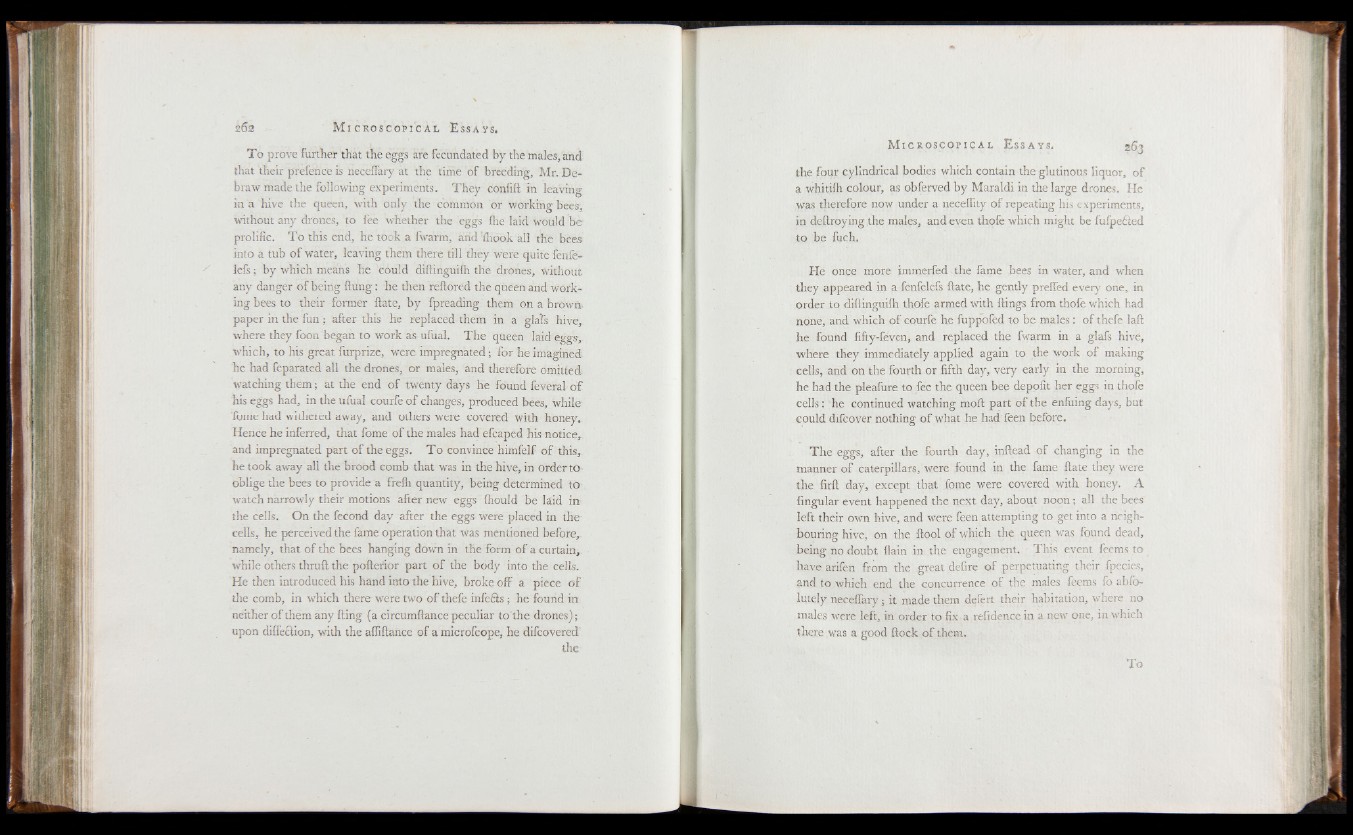
T o prove further that the eggs are fecundated by the males, and
that their prefence is neceffary at the time of breeding, Mr. De-
braw made the following experiments. They confift in leaving
in a hive the queen, with only the common or working bees,
without any drones, to fee whether the eggs Ihe laid would be
prolific. T o this end, he took a fwarm, arid 'fhook all the bees
into a tub o f water, leaving them there till they were quite fenfe-
lefs; by which means he could diftinguilh the drones, without
any danger of being flung: he then reftored the queen and working
bees to their former ftate, by fpreading them on a brown-
paper in the fun; after this he replaced them in a glafs hive,
where they foon began to work as ufual. The queen laid eggs,
which, to his great furprize, were impregnated; for he imagined
he had feparated all the drones, or males, and therefore omitted
watching them; at the end o f twenty days he found feveral o f
his eggs had, in the ufual courfe of changes, produced bees, while
Tome had withered away, and others were covered with honey.
Hence he inferred, that fome of the males had efcaped his notice,,
and impregnated part o f the eggs. T o convince himfelf o f this,.
he took away all the brood comb that was in the hive, in order to
oblige the bees to provide a frefh quantity, being determined to
watch narrowly their motions after new eggs lhould be laid in
the celts. On the fecond day after the eggs were placed in the
cells, he perceived the fame operation that was mentioned before,,
namely, that of the bees hanging down in the form o f a curtain,
while others thruft the pofterior part o f the body into the cells.
He then introduced his hand into the hive, broke off a piece o f
the comb, in which there were two o f thefe infefls; he found in
neither o f them any fling (a circumftance peculiar to’the drones);
upon diffeftion, with the afliflarice o f a microfcope, he difcovered’
the
M i c r o s c o p i c a l E s s a y s . 263
the four cylindrical bodies which contain the glutinous liquor, o f
a whitifh colour, as obferved by Maraldi in the large drones. He
was therefore now under a neceflity o f repeating his experiments,
in deftroying the males, and even thofe which might be fufpected
to be fuch.
He once more immerfed the fame bees in water, and when
they appeared in a fenfelefs ftate, he gently prefled every one, in
order to diftinguilh thofe armed with flings from thofe which had
none, and which of courfe he fuppofed to be males ; o f thefe laft
he found fifty-feven, and replaced the fwarm in a glafs hive,
where they immediately applied again to the work o f making
cells, and on the fourth or fifth day, very early in the morning,
he had the pleafure to fee the queen bee depofit her eggs in thofe
cells: he continued watching moft part o f the enfuing days, but
could difcover nothing o f what he had feen before.
The eggs, after the fourth day, inftead of changing in the
manner of caterpillars, were found in the fame ftate they were
the firft day, except that fome were covered with honey. A
Angular event happened the next day, about noon ; all the bees
left their own hive, and were feen attempting to get into a neighbouring
hive, on the ftool o f which the queen was found dead,
being no doubt {lain in the engagement. This event feems to
have arifen from the great defire o f perpetuating their fpecies,
and to which end the concurrence of the males feems fo abfo-
lutely neceffary; it made them defert their habitation, where no
males were left, in order to fix a refidence in a new one, in which
there was a good flock o f them.
T o